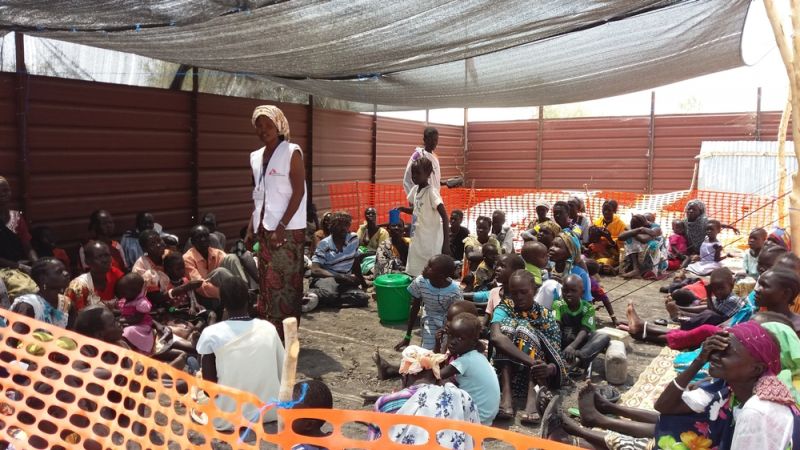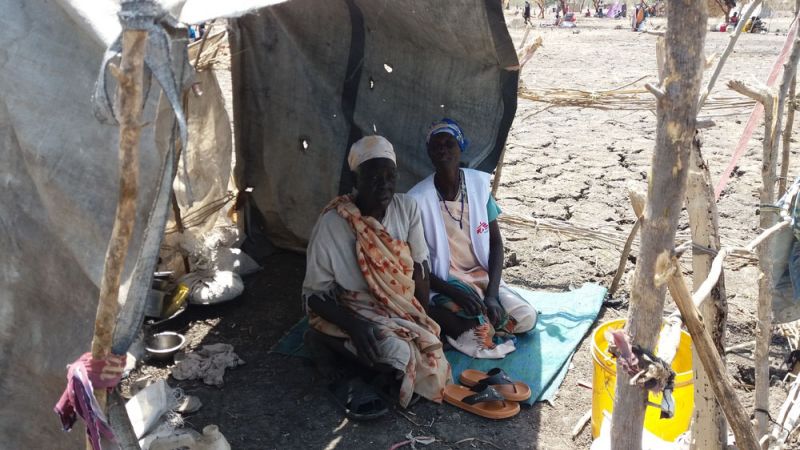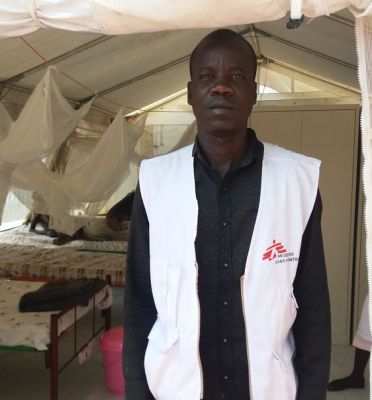Since late January, nearly 30,000 people have fled fighting around Wau Shilluk, in the Greater Upper Nile, and moved to Aburoch town and the bush areas south of Kodok.
Those who have settled in these areas have very little to survive on. For weeks people have only received an average of two litres of clean water per person. While in recent days this has slightly improved, the amount is still below guidelines for what is required to remain healthy in an emergency environment. Among the families MSF has visited, over 90% were lacking basic supplies such as plastic sheeting to protect them against the sun or the cold at night, jerry cans to collect clean water or cooking pots.

Forced to flee Wau Shilluk
Mary Mayik Lual is a 32-year-old single mother of five, who worked at the MSF hospital in Wau Shilluk. When the fighting started, she was forced to flee with the rest of the town’s population for Kodok and then on to Aburoch where MSF is running emergency operations.
On 3 February 2017, I was on duty in the hospital as the fighting drew closer to the town. I could hear the sound of artillery and gunfire. In the afternoon, I decided to leave the hospital and flee north with the rest of the population. As soon I managed to find my two children I left. After walking for many hours that night, I reached a village, some 13 kilometres from Wau Shilluk. In the chaos, I left mother behind who couldn´t walk.
The next day, we continued walking until we reached a village 20 kilometres further on. At that point, I decided to go back and find my mother. It was frightening to return. Thankfully, I found her walking on the road. I was so happy to see her.
With my two children and my 70-year-old mother, I moved first to Kodok and then to Aburoch which is some 80km to the north of Wau Shilluk. I was so worried that the fighting would catch up with us as my mother and children were unable to walk faster. There was no transport available.
I did not have a chance to pack food, and there was no water available. I decided to walk along the river so that we could get some water, but my younger child fell sick during our escape. Both my sick son and my mother were too exhausted to walk.
In Aburoch, we spend the days and nights in the open as we have nothing to use as shelter. One family shared a piece of plastic sheeting with us. There isn’t enough water, and we have been waiting for food for several weeks. As the queues are so long and you have to wait for hours, I fetch water at night when the hand-pump is free. I fear for my safety when I am out at night.
This is not the first time that I have had to flee my home. In 2014, I was living in Malakal when it was attacked. It was a frightening time, and I used a canoe to escape, and reach the west bank of the Nile. There were many of us fleeing that day and a boat full of women and children sank while crossing the river. Many people died.
I lost my brother during the fighting in Malakal. During our escape, I also got separated from three of my children, and it took me months to find them in Wau Shilluk. I don’t want that to happen again.
As I was afraid of losing my children again, I sent three of them to Sudan where I know they are safe. I don´t know where I will go next. I have been forced to move five times since the start of this war, and I am tired of running.

"We carried on working until it was too dangerous to stay", Francis Ronyo, an MSF nurse
For the last two years, Francis Ronyo worked as a nurse in MSF’s Wau Shilluk hospital. He was one of the national staff on duty when the order was given to evacuate and leave for Kodok.
On 3 February, we were on duty in the MSF hospital. The fighting was getting closer to the town, and the remaining civilian population had started to flee. We carried on working until it was too dangerous to stay. We had patients who had been admitted that afternoon. My team didn´t want to leave our patients behind. It was a difficult decision to leave the hospital while we were still receiving patients in critical condition.

I was the supervisor of the nurses in the hospital, and we decided to load the patients onto a tractor and trailer and go with them to Kodok. On the way, we saw people fleeing in the same direction with no water or means of transport We picked up some of the wounded and the sick. Some of our staff jumped out to make space for them on the trailer. Unfortunately, one of our patients died on the way. By midnight, we arrived at the hospital in Kodok with 13 patients.
When I arrived in Kodok, I didn´t have a place to stay and ended up sleeping in the open with the rest of the people from Wau Shilluk. I decided to continue serving the sick and the wounded any way I could. Initially, I started helping at the hospital that is run by another organisation in Kodok, and which was overwhelmed by the number of patients it was receiving. Since 20 February, I have been working in this MSF clinic in Aburoch, providing medical assistance to the displaced people.
“My future is unclear, and I don´t know what will happen to all of us from Wau Shilluk.” I have my family in Yei, in the Greater Equatorian region. I took them away from here in 2014 because I was afraid for them and I wanted them to be safe.
At the moment, I’m having trouble communicating with them. Last week, I cycled 45km to make a phone call to my wife and children. The telephone network was shut down in January 2017, and I am worried about their security. Currently, the situation here is incomparable to that of Wau Shilluk where we lived just a few weeks ago. Here, there is hardly any water, shelter or food. We are suffering.
Read more:
- Urgent humanitarian assistance needed in South Sudan
- Ongoing conflict at root of nutrition crisis in South Sudan
Read more about MSF's activities in South Sudan.